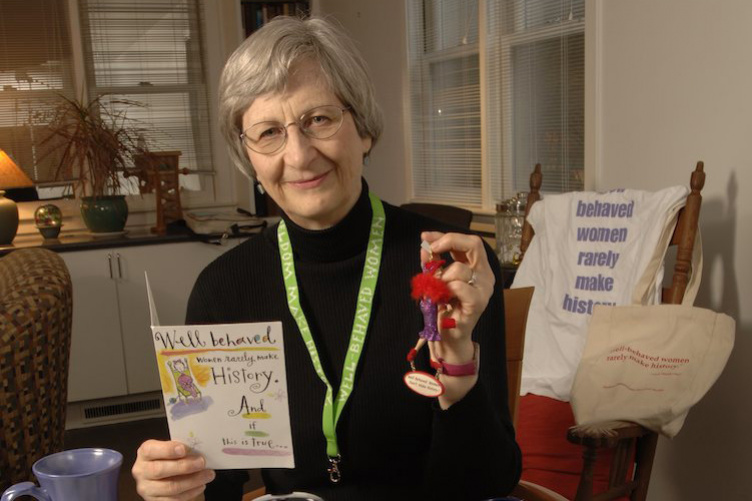
Laurel Thatcher Ulrich '80 Ph.D. with an assortment of merchandise bearing her saying, "“Well-behaved women seldom make history.”
The history of International Women’s Day was built on the shoulders of those who supported women garment workers in New York City in 1909, and the 100 attendees of a women’s conference in Denmark a year later who wanted to advance equal rights and suffrage for women. In 1917, International Women’s Day in Russia had women in Saint Petersburg demanding an end to food shortages and czarism.
Here at UNH, recalling the steps taken to reach the day that is now celebrated around the world on March 8, we can’t help but think of the words written by Laurel Thatcher Ulrich, ’80 G: “Well-behaved women seldom make history.” We asked her to share her thoughts on International Women’s Day. Here’s what she has to say.
UNH Today: International Women's Day has been described as a time to celebrate women’s economic, political and social achievements. Do you have a sense of how much there is to celebrate?
LTU: There are always things to celebrate, but I am not sure celebration has been the central focus of International Women’s Day. The idea emerged, I believe, from working women’s protests in the early 20th century. The need for protests — and other concentrated efforts to bring about change — has not passed.
UNH Today: This year’s theme is “Be Bold For Change.” What do you see as the key changes still needed for women?
LTU: Let’s begin at the most basic level. Who is caring for children, the sick and the elderly in our society? Although men are engaged in caregiving, women still predominate, especially at the lowest levels, in nursing, childcare, teaching and home services. Some of the most essential work in our society is done by immigrant women who have left their own children behind in order to provide income for their support. That is a very old pattern in history and now a global one.
"The need for protests — and other concentrated efforts to bring about change — has not passed."
UNH Today: The sentence “Well-behaved women seldom make history” came from an article you wrote when you were a graduate student at UNH in the 1970s. What was the article about and what did you mean?
LTU: It was an article about Puritan funeral sermons! At the time, the few historians of early New England who had anything to say about women focused on dramatic events, like the Salem witch trials, an important topic to be sure. But I was interested in those women Cotton Mather called “the hidden ones,” the ones who sustained the colonies day by day. My comment was a gentle jab at the narrow interests of historians, but also at the difficulty of writing about people who did not leave much of a record. To reconstruct the lives of women in “Good Wives” (1982), I sifted out details from hundreds of documents produced for other purposes, including funeral sermons. It was detective work.
UNH Today: Does it take making a commotion — misbehaving — for a woman to make history?
LTU: No. But commotions often produce records. History is an account of the past based on surviving sources. If there is no source of information about the past, there is no history. That is why the effort to gather and preserve the records of otherwise marginal people is so important. I found the diary of Martha Moore Ballard, the 18th-century midwife whose life I explored in “A Midwife’s Tale” (1990) because someone took the trouble to compile a bibliography of women’s writings in small historical societies. The few people who had looked at Ballard’s diary thought it was “trivial” but her patient accounting of what she did every day transformed my own and other’s understanding of health care in early America. Oral history projects and documentary films provide the foundation for similar projects in our own era. Some of that work has been done by students and faculty at UNH.
UNH Today: How do you feel about the way your famous comment is being used today?
LTU: I am fascinated by the many meanings people have found in it. You can use it to justify a little naughtiness or to argue for standing up against injustice. For those of us who were socialized to be agreeable, it is a reminder that being liked is not always the higher good. I am delighted when people engaged in good causes send me photographs of bumper stickers and posters displaying my words. There are many ways to “make history.” I admire those who do it with purpose.
Ulrich is a history professor at Harvard University. “Well-Behaved Women Seldom Make History” (Alfred A. Knop) was released in 2007. Her latest book, “A House Full of Females: Plural Marriage an Women's Rights in Early Mormonism, 1835-1870” (Alfred A. Knop), was released in January.
-
Written By:
Jody Record ’95 | Communications and Public Affairs | jody.record@unh.edu



















































